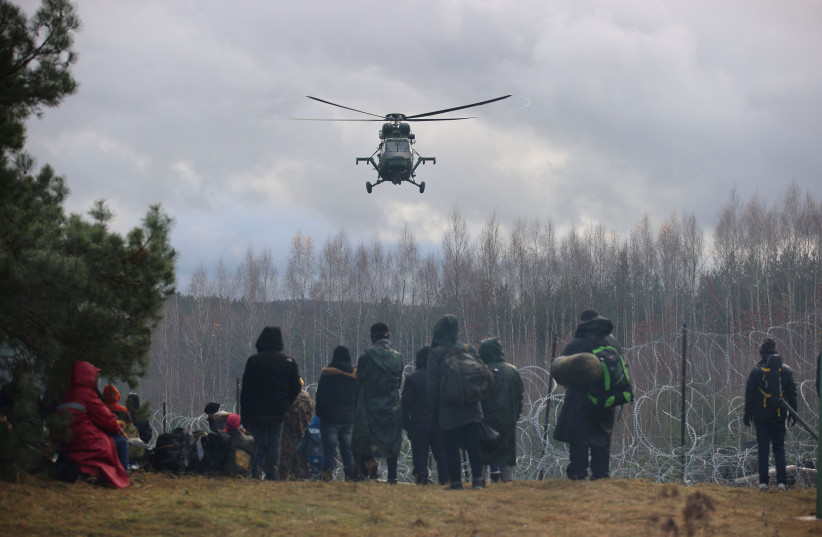Bans are going up across the Middle East seeking to prevent Iraqis, Syrians and others from going to Belarus after a migrant border crisis developed between Belarus and Poland.
The Guardian reported last week that Turkey was blocking citizens of Syria, Yemen and Iraq from getting airline tickets to Belarus. The sweeping move conjures up memories of the Trump era “Muslim ban.”
In January 2017 the US banned people from seven Muslim-majority countries, Iran, Iraq, Syria, Yemen, Somalia, Sudan and Libya from entering the US for 90 days.
For some reason in 2017 the decision to block all the people from these countries, regardless of their individual cases, was controversial, while calls to ban people from similar countries going to Belarus have been greeted with support in Europe.
This illustrates how migrants and refugees appear to be supported and greeted so long as they come from certain places or via certain methods and not others. It also shows the hypocrisy whereby some countries, like Turkey, can abuse Syrians, but others are critiqued for doing the same thing.

For instance, Turkey used Syrians and other refugees as a threat against Greece for years, claiming Turkey would open the border if it wasn’t paid not to do so. When Belarus welcomed Iraqis and Syrians and encouraged them to go to Poland it was accused of using “hybrid” warfare. It is unclear why a Syrian entering from Turkey to Greece is a refugee, but a Syrian going via Belarus is a “hybrid war.”
Many of the people who went to Belarus are Kurdish and some of them are Yazidis. As such they are persecuted minorities in their home countries. Now Turkey has banned these Kurds from Iraq and Syria from traveling. According to The Guardian “Belavia, the Belarusian state airline said it would no longer carry citizens of those countries to Belarus.”
In another development, the European Union was considering sanctioning a Syrian airline called Cham Wings and also a hotel in Minsk where refugees had gone. Financial Times wrote that this was “to press authoritarian leader Alexander Lukashenko to stop the flow of migrants to Europe’s borders.” Reports say Syrians are coming on Cham Wings flights. Now it appears Cham Wings has suspended flights. Iraqi airways also suspended flights to Minsk, reports say. Suddenly Syrians and Iraqis can no longer fly to Belarus. This is regardless of who they are or their work. Migrants who did end up in Belarus are now stuck on the border. Some have paid thousands of dollars to get to Belarus, thinking this might be an easy way to get to Europe.
It is a reminder that back in 2015, Germany invited Syrians to come to Europe and more than a million people made their way, sometimes by boat, through Greece Serbia and other states in 2015. People also come from North Africa. Last week the UK said they had received the most migrants in a single day via the English Channel, with 1,000 people crossing illegally in a day.
It appears the EU will pressure more countries to prevent Iraqis and Syrians from going to Belarus. It remains unclear why it is that some of the same critics who lashed out at the US for a “Muslim ban” in 2017 are in effect banning people from the same countries, and even banning them from flying from Iraq to Syria or from the Middle East to Belarus.
It also remains unclear why when Turkey encouraged migrants to cross into Greece the migrants were seen as victims but in this case the EU is working to keep migrants as far away as possible. It raises questions about blanket discrimination by airlines and countries against specific people for their national origin. It’s also unclear why asylum seekers, such as Kurds and Yazidis are unable to be welcomed for asylum, while in other instances people have been welcomed at other borders.
Russia has been accused of exploiting the crisis, and Russia’s Tass media blamed has carried headlines blaming the West for the crisis. Meanwhile, Russia’s President has been opposed to Belarus cutting energy and gas supplies to Europe in retaliation for sanctions. This shows that the migration crisis is merely a symbol of a larger struggle and complex ties between Moscow, Europe, Belarus and Turkey.
For the thousands of migrants now risking a cold winter stuck on the border with no where to fly to or no way to cross the border, the tragedy is compounded by countries trying to close the gates in retaliation against one another.
